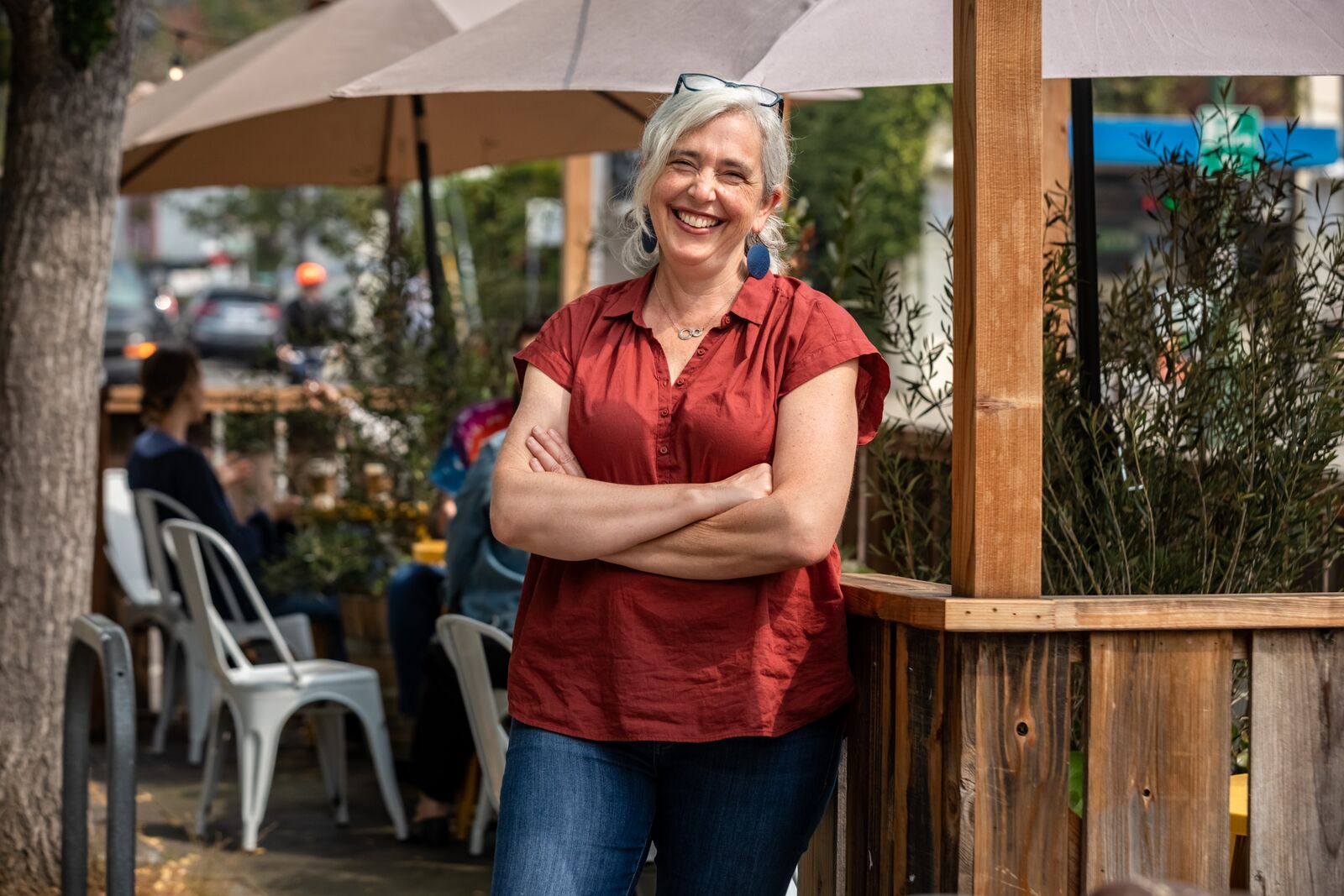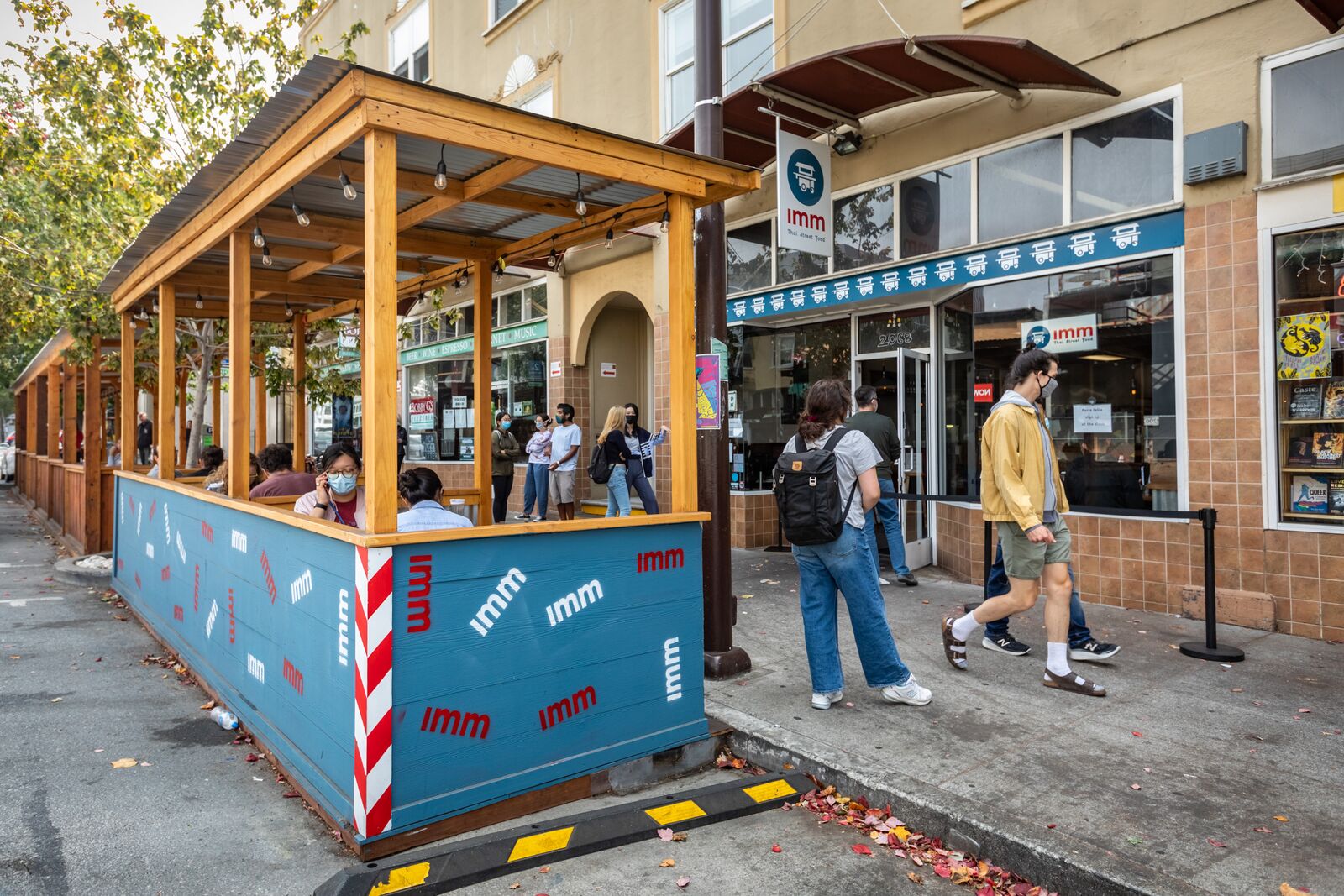
September 17, 2021
BERKELEYSIDE — A year and a half ago, the streets of Berkeley were unusually quiet, as people sheltered at home due to COVID-19.
Today is totally different — thanks in part to a burst of open air eating areas, which are extending the city’s cuisine culture from inside to out. From pasta to pad thai, and microbrew to milkshakes, outdoor dining is breathing life into businesses that might otherwise have closed during the pandemic.
These parklets, sidewalk seating and other outdoor dining areas are also breathing life into city streets. With a diversity of designs and menus, they create urban oases, often surrounded by lush plants, glistening with strings of lights, piped for music or accompanied by the chatter of diners and nearby shoppers. They’re appearing throughout town, along major streets, and on wider sidewalks.
Outside dining space is a lifeline, business owners say. And it’s also creating a street-sharing joy that should last, they add.
Initially created as a temporary measure to help local businesses survive — and protect patrons and staff from a virus that circulates in crowded indoor spaces — many parklet sponsors plan to work with the city to gain permanent status.
West Berkeley

At Standard Fare (2701 Eighth St. at Carleton), the new outdoor dining space is helping the West Berkeley business “get back to what the pandemic has taken away from us,” said Kelsie Kerr, owner. The neighborhood, like many in Berkeley, has seen a drop in foot traffic with many local workers still telecommuting.
The new outdoor space brings back the connection of shared mealtimes, a place for people to “break bread side by side” in fresh air with social distance, Kerr said. Standard Fare offers delicious seasonal, organic food for breakfast and lunch. “Community building is an important focus of the business,” Kerr adds.
She is cautious about what lies ahead but hopes the parklet will be a welcome stop to help customers “join back into the world.”
The Elmwood

Across town, Baker & Commons’ parklet in the Elmwood District (2900 College Ave., at Russell) is not only helping it survive COVID-19 times, but allows the restaurant to further embrace the location’s tradition as a gathering place for College Avenue visitors.
Known for scrumptious biscuits, scones, and pastries, along with good coffee, Kara Hammond, a co-owner, sees the outdoor eating area as just a “natural extension of the business,” which has the ‘commons’ part of its name to reflect the space’s intention to foster conversation, connection and community.
The restaurant, which also serves fresh, delicious lunches, and soft-serve ice cream, operates in the 100-year-old corner building which old-timers knew as Ozzie’s Soda Fountain.
North Berkeley

At another long-standing Berkeley business, Saul’s Delicatessen (1475 Shattuck Ave., near Vine) the parklet has been “instrumental in keeping [the business] afloat,” said Peter Levitt, co-owner. Saul’s, a 30-year Berkeley institution in the North Shattuck area with deli take-out, sit-down meals, and special menus and entertainment for Jewish holidays, established one of the first parklets in Berkeley, pre-pandemic.
The venue has been a lifesaver for business, but also vitalizes the block, which helps with safety and cleanliness, he said. “When you have the citizenry’s eyes on the location, they own the space.”

With the city establishing a “path to permanence” for on-street commerce, Saul’s plans to apply. After the local COVID-19 emergency is declared over, the process will require outdoor commerce owners to pay for lost parking space revenue. Levitt thinks this is a fair trade-off, believing the city’s loss of revenue from parked cars is probably ‘more than offset’ by the economic boost of a popular parklet, which helps generate sales tax revenue for all businesses on the block.
Since the pandemic started, the city has approved nearly three dozen permits for outdoor dining — in parklets or on sidewalks — and issued more than 15 grants to Berkeley businesses participating in outdoor commerce. Many of these businesses are expected to apply for permanence — an indication that Berkeley’s lively outdoor eatery scene won’t disappear if and when COVID-19 does.
Downtown

Aya Amornpan, owner of Imm Thai Street Food (2068 University Ave. near Shattuck), also believes the outdoor dining spaces in Downtown Berkeley and along the University Avenue corridor have made the areas more vibrant and are generally well-received by other business owners. In fact, her new outdoor structure helps her cozy, hole-in-the-wall restaurant make up for pandemic-related financial losses while creating a more authentic dining experience for customers. Imm’s specialty dishes are typically served by street vendors in Thailand and eaten outside.
South Berkeley


And Hoi Polloi Brewing (1763 Alcatraz Ave.) in South Berkeley’s Lorin District offers a venue for those who wish to end their day with a drink under the stars or in the fog. (Many of the city’s parklets have patio heaters.)
Established in Berkeley in 2014, Hoi Polloi— Greek for “the masses” or “common people” — features their own beer (brewed in Oakland), hard ciders, and wine at its tap room and beat lounge. Owner, Viet Vu, says the name reflects the brewery’s values and his desire to create a “safe space for people from diverse backgrounds.” Having invested in their Berkeley space during the pandemic, they are now seeing the returns. Not only does their outdoor venue help pay the bills and limit the spread of the COVID-19 virus, but it has increased collaboration with the restaurant next door, Easy Creole (1761 Alcatraz Ave.), to create a section along Alcatraz that is full of energy.
With a business model that embraced an investment in parklet-occupied parking spaces, Vu hopes the open air will help customers experience his vision of an egalitarian, people-centered Berkeley.
This story was paid for by the City of Berkeley’s Office of Economic Development. The office helps new and established Berkeley businesses build strong connections to the community, navigate local policies, find affordable financing and real estate —and become more sustainable. During the global COVID-19 pandemic, OED staff are helping entrepreneurs, artists and community organizations to maintain business continuity and plan for a brighter period ahead.
What Next
- Check out Visit Berkeley’s Dine & Drink, Outside! online guide for more al fresco dining this fall.
- Learn how to get a City of Berkeley Outdoor Commerce & Dining permit or apply for an Outdoor Commerce Grant.
- Follow @DiscoveredinBerkeley on Instagram to see more innovative Berkeley businesses. The campaign spotlights local businesses enriching our community and building a better world.




